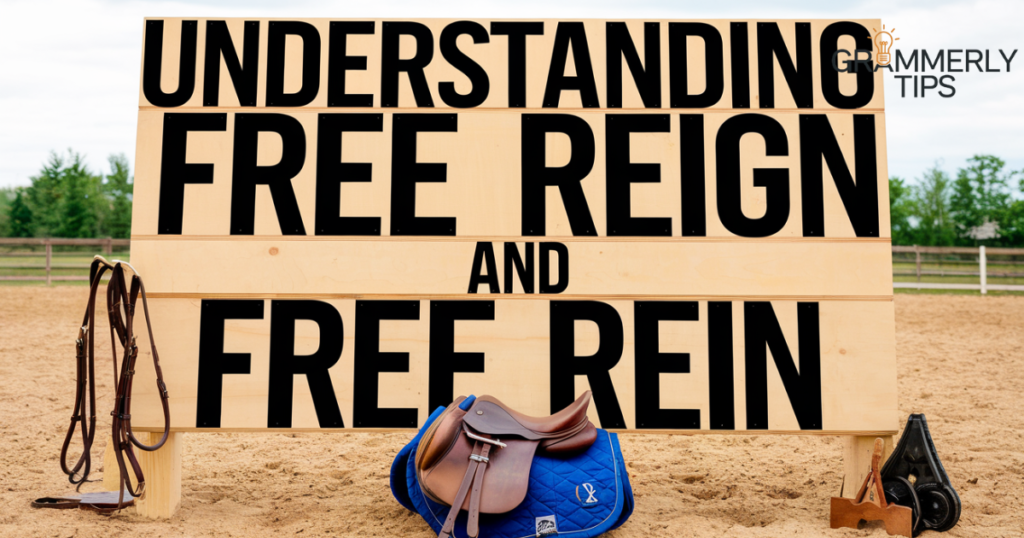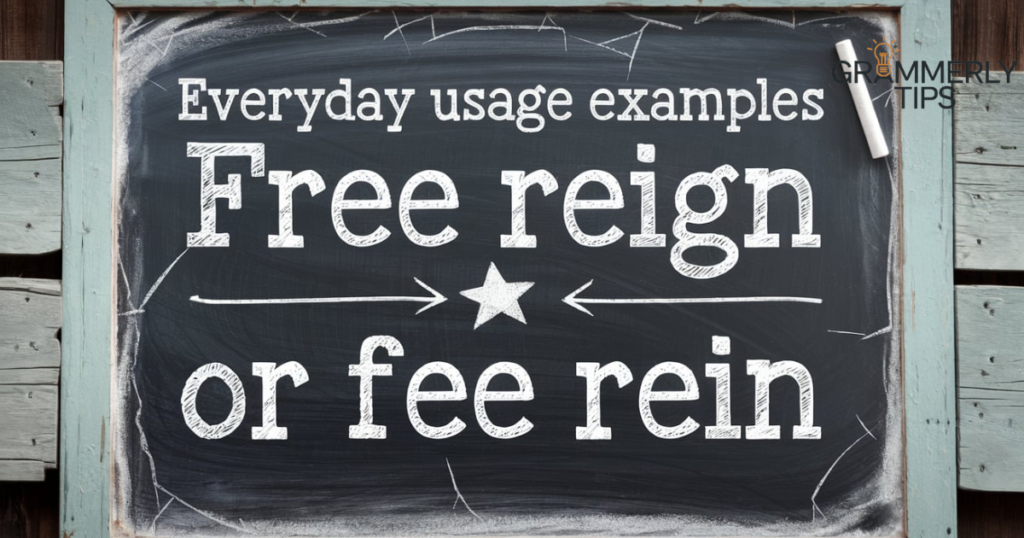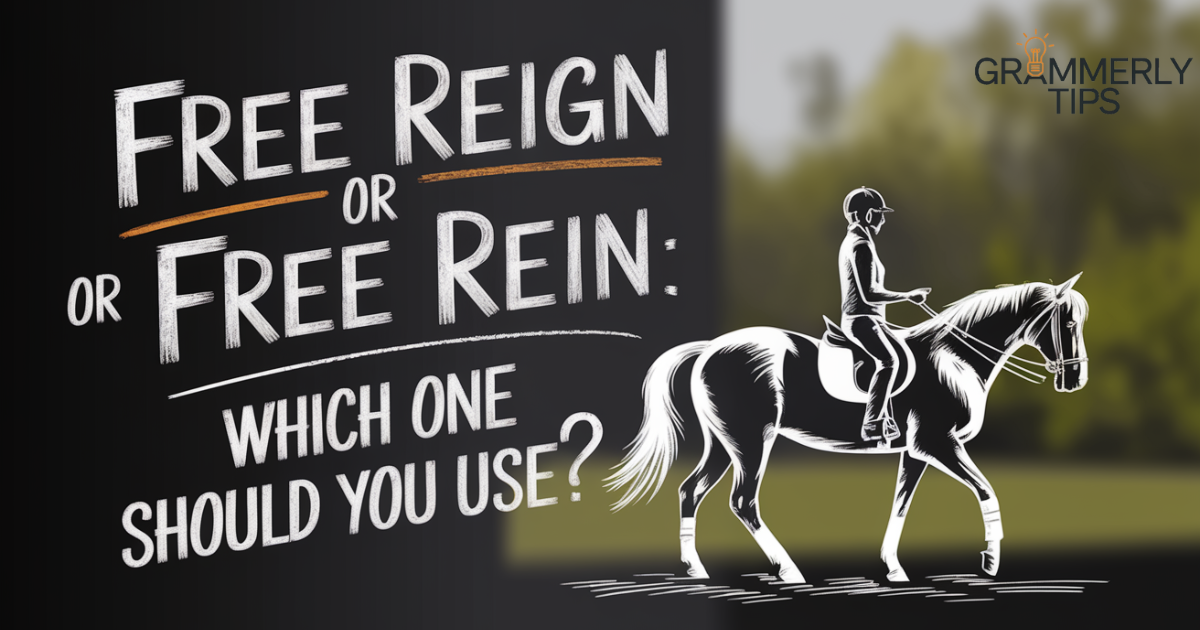Have you ever stumbled upon the phrases free reign or free rein and wondered which is correct? These expressions are often used interchangeably, but only one is truly accurate. Understanding the difference can help you use the right term with confidence.
The phrase “free rein” originates from horseback riding, symbolizing giving a horse the freedom to move as it pleases. On the other hand, “free reign” is a common mix-up influenced by the idea of ruling power. Let’s explore the correct usage and why it matters.
Understanding Free Reign And Free Rein

Free Reign: Definition and Usage
“Free reign” is a common error often confused with “free rein.” It suggests unrestricted authority or dominance, like a ruler’s reign. While widely used in informal writing, it’s not considered correct in formal contexts.
The phrase stems from a misunderstanding rather than historical usage. To convey freedom, “free rein” is the proper term.
For Example
Incorrect Usages: The manager gave his team free reign to handle the project.
Explanation: This is incorrect because “free rein,” not “free reign,” is the proper term. The expression originates from horseback riding, meaning the rider loosens the reins, allowing the horse freedom to move. “Reign” refers to ruling or dominating, which is unrelated to the intended meaning.
Incorrect Usage: She has free reign to decorate her apartment however she likes.
Explanation: Again, this is a misuse. The correct phrase is “free rein,” signifying unrestricted freedom. Using “reign” here incorrectly implies she rules or governs her apartment, which changes the meaning of the sentence.
Free Rein: Definition and Usage
“Free rein” is the correct phrase used to describe giving someone unrestricted freedom to act or make decisions. The term originates from horseback riding, where loosening the reins allows the horse to move freely. It metaphorically means granting autonomy without interference.
For example, “The director gave the team free rein to execute their ideas.” Unlike “free reign,” this phrase correctly captures the concept of freedom, not control. Using “free rein” in both formal and informal writing ensures accurate and professional communication.
For Example
Correct Usage: The artist was given free rein to design the mural as she envisioned.
Explanation: In this sentence, “free rein” is correctly used to indicate that the artist had complete freedom to create without restrictions. The term aligns with its original meaning of granting autonomy.
Correct Usage: The manager gave his team free rein to brainstorm innovative solutions for the project.
Explanation: Here, “free rein” accurately conveys that the team was allowed to explore ideas independently, reflecting the concept of unrestricted freedom. This is the proper usage compared to the often mistaken “free reign.”
What is the Difference Between Free Rein and Free Reign?
The difference lies in their meanings and origins. “Free rein” is the correct term, originating from horseback riding, symbolizing giving freedom to act or decide without restriction. In contrast, “free reign” is a common error influenced by the word “reign,” which refers to ruling or governance.
While “free rein” implies autonomy, “free reign” incorrectly suggests control or dominance. For example, “free rein” is used in sentences like, “The designer had free rein to create the collection.” Understanding this distinction helps maintain clarity and correctness in communication.
When to Use Free Rein
Use “free rein” when describing a situation where someone is given complete freedom to act or make decisions. This phrase is appropriate in both formal and informal contexts to convey autonomy.
For example, “The teacher gave the students free rein to choose their project topics.” It’s most suitable when emphasizing independence without interference. Always opt for “free rein” instead of the commonly mistaken “free reign” for accuracy.
Other Uses of Rein
The word “rein” has various uses beyond the phrase “free rein.” It often refers to controlling or guiding, as in horseback riding, where reins direct the horse. Metaphorically, it appears in expressions like “tighten the reins,” meaning to enforce stricter control. Similarly, “rein in” is used to describe restraining or limiting something, such as emotions or spending.
These usages highlight “rein” as a symbol of authority and guidance. Understanding these contexts enhances your language precision.
When to Use Free Reign
“Free reign” is often mistakenly used in place of “free rein” but should generally be avoided in most cases. It suggests the idea of having unlimited power or control, which is not the intended meaning. The correct phrase is “free rein,” which indicates freedom to act without restrictions.
However, “free reign” might be used informally in casual conversations, though it’s inaccurate. To maintain proper usage, always opt for “free rein” when discussing freedom or autonomy.
Remember the Difference: Free Reign vs. Free Rein?
It’s important to remember that “free rein” is the correct phrase when referring to freedom or autonomy. Originating from horseback riding, it signifies allowing someone to act without restriction. On the other hand, “free reign” is a common mistake, often used mistakenly to imply control or dominance, like a ruler’s reign.
While both phrases sound similar, only “free rein” conveys the intended meaning of independence. Using the wrong phrase can lead to confusion or miscommunication. Stick with “free rein” to ensure your message is accurate and clear.
Side-by-Side Comparison
| Phrase | Correct Usage | Meaning | Origin | Common Usage | Key Difference |
| Free Rein | The manager gave the team free rein to explore new ideas. | Freedom to act or make decisions without interference. | Originates from horseback riding, where reins are loosened for freedom. | Used to describe giving someone full autonomy or freedom. | “Free rein” is used to describe freedom and independence, typically in decision-making or creativity. |
| Free Reign | She had free reign over the office decor. (Incorrect usage) | Incorrectly suggests control or dominance, implying ruling power. | Derived from a misinterpretation of “reign,” which refers to ruling. | Sometimes used informally, but incorrectly, to imply control or leadership. | “Free reign” mistakenly suggests authority or control, which is the opposite of the intended meaning. |
The table compares “free rein” and “free reign,” highlighting their meanings, origins, and common usage. “Free rein” correctly refers to granting freedom and autonomy, especially in decision-making or creativity.
In contrast, “free reign” is an incorrect version, often mistakenly used to suggest control or dominance, which contradicts the intended meaning. The key difference lies in “rein” representing freedom, while “reign” refers to ruling power.
Everyday Usage Examples

Free Rein (Correct Usage)
- The teacher gave the students free rein to choose their research topics.
- The CEO gave the marketing team free rein to develop a new campaign.
- The chef was given free rein to design the restaurant’s new menu.
- The parents gave their children free rein to decorate their rooms.
- The director gave the actors free rein to interpret their characters creatively.
Free Reign (Incorrect Usage)
- She had free reign to decorate her office as she wished.
- The new manager was given free reign to change company policies.
- The coach gave the players free reign to choose their own practice drills.
- The boss gave her assistant free reign over the schedule.
- He was given free reign to make all the decisions for the project.
FAQs
Is the saying free reign or free rein?
The correct saying is “free rein.” It refers to giving someone complete freedom to act or decide without restriction.
Is it rein or reign?
The correct word is “rein.” “Rein” comes from horseback riding, where it refers to controlling the horse’s movement.
What does give a free rein mean?
To “give a free rein” means to allow someone full freedom to make decisions or act as they wish without interference.
How do you say to have free reign?
The correct phrase is “to have free rein,” meaning to have the freedom to act or decide without limits.
Conclusion
The article clarifies the common confusion between “free rein” and “free reign.” It explains that “free rein” is the correct phrase, originating from horseback riding, where it means giving someone the freedom to act or decide without restrictions.
On the other hand, “free reign” is a mistaken version, often used incorrectly to suggest control or authority, which is not the intended meaning. By understanding the distinction, readers can communicate more accurately.

Grammerlytips.com, authored by Jame, offers expert tips and insights on mastering grammar, enhancing writing skills, and boosting communication effectiveness.

